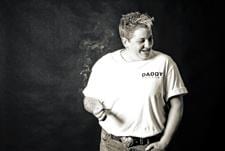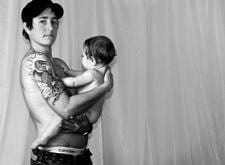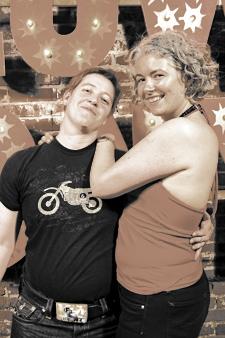
Artist Shaira (SD) Holman is focusing on butch identity through the Butch: Not Like the Other Girls project. Credit: Shaira (SD) Holman photos

Credit: Shaira (SD) Holman photos
“They’re definitely not out of date — there’s one pound of reasons why,” Ivan E Coyote says, indicating Persistence’s 300-plus pages of poignant, defiant, sometimes amusing and often challenging exploration of the terms butch and femme.
“Not only are these words not archaic, I see that a renaissance is happening,” adds Coyote, who co-edited the anthology on All Ways Butch and Femme with Zena Sharman.
With this renaissance comes some redefinition as old stereotypes and restrictions yield to more complexity and contradictions. The expanded butch-femme umbrella now encompasses many identities and is no longer exclusively lesbian — or even female.
“I certainly consider us female- pronoun-using butches ‘original’ or ‘classic,’ like in classic Coke,” says Jeanne Córdova, an “open butch for 42 years” who contributed to both Persistence and the 1992 book it pays homage to, Joan Nestle’s The Persistent Desire: A Femme-Butch Reader.
“But after you get more secure in which piece of the butch pie you naturally belong in, you realize that woman-identified butches, male-identified butches and non-gender-specific butches are different in some core identity respects. And you come home to the security of knowing there have always been, and will always be, several if not many kinds of butches.”
Past descriptions of butch point to expressions of female masculinity in appearance, mannerisms, chivalry, the bedroom and even employment. So what is butch now? Masculinity may remain a constant thread, but emerging interpretations of butch are more flexible and personal. From gender transition to pregnant butches, Persistence offers snapshots of new faces of butch and their related terminology: stud, boi, tom, macha, dom, ag.
Just as the concept of butch is stretching to encompass more lives and expressions, so too is the concept of femme with the emergence of, for example, dominant stone femmes, male-pronoun-using femmes and futches — a butch-femme hybrid.
“I heard a rumour that the younger queers don’t like the word butch,” Coyote writes in Persistence. “This makes me wonder — if I were 20 years old right now instead of 40, what would I call myself?”
While reluctant to use labels at all, Coyote explains, “Butch is the word that fits me best. It is the one that sticks best and pulls the least. I have no desire to gatekeep the word butch or to define it for someone else. It has always been a complex term, both historically and in the present day. It is definitely not an identity that can be neatly summed up in a catchy sentence.”
Butch is a self-definition, agrees Anne Fleming, a creative-writing professor at the University of British Columbia. But she believes that common ground — from double takes in bathrooms to family tension — bonds a “butch fraternity,” encompassing a range of identities, genders and pronouns.
“There are a lot of different ways to be butch,” she says. “It’s not ever monolithic. It varies from individual to individual, yet we have these commonalities. Butch is not a faked or pretended masculinity but a distinct masculinity, with its own fluidity and give, depending on who’s inhabiting it.”
Does the increasing diversity of newer butch expressions dilute or threaten those who might once have been considered typical butches? “No,” says Córdova. She believes the decade of change between the two anthologies — and the emergence of trans guys who, in an earlier era, may have lived as butch but now transition to male — has prompted “a fundamental reinterpretation of previous lesbian butch identity.”
But this should be celebrated, not feared, she maintains.
“We now exist more as ourselves and not just relationally to other lesbians or any straight people,” she says, suggesting butch be considered its own gender, separate from male and female. “Hats off to queer politics and the age of trans for giving us a new, broader life.”
Sinclair Sexsmith, who runs the Sugarbutch Chronicles online writing project, claims to know more butches now than ever before. As attendance rises and diversity expands at events such as the Butch Voices conferences, Sexsmith answers declarations such as “The butch is back” with “Did we ever leave?”
“Maybe we did in some people’s minds, but I am sure we’ve been here all along,” Sexsmith writes in Persistence. “Perhaps we went underground, perhaps we weren’t in vogue, but this particular manifestation of gender and sexuality has a long history and continues to thrive and survive.”
Some view the new era with suspicion, not celebration. Lingering conflict between lesbian, trans and feminist politics often surrounds the issue of butch flight — the idea that if some people had not transitioned, they would still be butch lesbians.
In her chapter, “Changed Sex, Grew Boobs, Started Wearing a Tie,” Amy Fox writes that there is no butch flight — there is butch arrival.
“When we imply that FTM men are still gay women, how can we also fear that ‘we are losing our butches?’” she asks. “Our butches? Whose butches? Does the dyke community own its members? Our sex lives? Our genders?”
Vancouver artist Shaira (SD) Holman is focusing on butch identity through the Butch: Not Like the Other Girls project, featuring photos of 100 butches from around the world.
Having looked through the lens at “pregnant butches, butches with babies, butches of all different colours, sizes, shapes and ethnicities,” Holman rejects the concept of a typical butch.
“Each subject is asked what butch is to them, and there are many different answers. A lot of it isn’t about appearance but about ways of being in the world,” Holman says. “Queer female masculinity is how I define butch, but some people would disagree with me, and that’s okay.”
Mainstream acceptance of supposedly “glamour butches” Rachel Maddow and Ellen DeGeneres may be welcomed by some as an undressing of the old army-boot, plaid-shirt butch stereotypes. But columnist and author Victoria Brownworth laments the assimilation of “safe” queer identities and the exclusion of those who don’t have a match in the straight world, including butch women.
She believes “bull dykes and nelly queens” are now marginalized, including in bars, where “the stone butches have been replaced by sleek, suburban-style dykes,” and on television, where “the butchest lesbian character is Shane from The L Word, one of the softest butches to ever strut her stuff.”
“What about the butch lesbian who’s not a soft, non-threatening butch but a tough, masculine-identified yet wholly lesbian and not transgender butch?” Brownworth writes in Persistence. “Is there a central place for her in assimilationist queer society, or is she relegated forever to the fringe, marginalized in ways that even pre-Stonewall butches were not?”
“People should be able to choose who they fuck, what they look like and what pronoun they use without question or pathologizing,” Sharman tells Xtra. “We aren’t trying to suggest that someone should have to be butch or femme. But if it’s an identity that resonates with you, come in.”
Coyote is comfortable now as a butch who knits, has a fluffy dog and drinks vodka-cranberry, but of her younger days she recalls “feeling a real sense of shame about my sexuality and desires, and how I wanted to see and be seen in the world.”
“Part of this book is about creating a space where that’s not going to happen to younger butches,” she says. “It’s not a race to some butch finish line. It’s not linear; it’s not a contest. It’s a collective.”

 Why you can trust Xtra
Why you can trust Xtra


